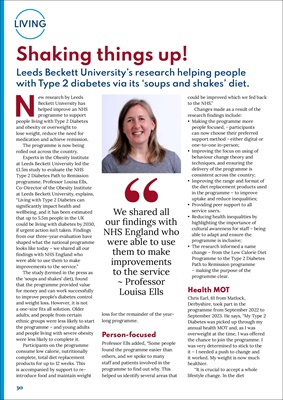
30
LIVING
Shaking things up!
Leeds Beckett University's research helping people
with Type 2 diabetes via its 'soups and shakes' diet.
New research by Leeds
Beckett University has
helped improve an NHS
programme to support
people living with Type 2 Diabetes
and obesity or overweight to
lose weight, reduce the need for
medication and achieve remission.
The programme is now being
rolled out across the country.
Experts in the Obesity Institute
at Leeds Beckett University led the
£1.5m study to evaluate the NHS
Type 2 Diabetes Path to Remission
programme. Professor Louisa Ells,
Co-Director of the Obesity Institute
at Leeds Beckett University, explains,
"Living with Type 2 Diabetes can
significantly impact health and
wellbeing, and it has been estimated
that up to 5.5m people in the UK
could be living with diabetes by 2030,
if urgent action isn't taken. Findings
from our three-year evaluation have
shaped what the national programme
looks like today - we shared all our
findings with NHS England who
were able to use them to make
improvements to the service."
The study (termed in the press as
the 'soups and shakes' diet), found
that the programme provided value
for money and can work successfully
to improve people's diabetes control
and weight loss. However, it is not
a one-size fits all solution. Older
adults, and people from certain
ethnic groups were less likely to start
the programme - and young adults
and people living with severe obesity
were less likely to complete it.
Participants on the programme
consume low calorie, nutritionally
complete, total diet replacement
products for up to 12 weeks. This
is accompanied by support to reintroduce
food and maintain weight
We shared all
our findings with
NHS England who
were able to use
them to make
improvements
to the service
~ Professor
Louisa Ells
loss for the remainder of the yearlong programme.
Person-focused
Professor Ells added, "Some people
found the programme easier than
others, and we spoke to many
staff and patients involved in the
programme to find out why. This
helped us identify several areas that
could be improved which we fed back
to the NHS."
Changes made as a result of the
research findings include:
• Making the programme more
people focused, - participants
can now choose their preferred
support method - either digital or
one-to-one in-person;
• Improving the focus on using of
behaviour change theory and
techniques, and ensuring the
delivery of the programme is
consistent across the country;
• Improving the range and format of
the diet replacement products used
in the programme - to improve
uptake and reduce inequalities;
• Providing peer support to all
service users.
• Reducing health inequalities by
highlighting the importance of
cultural awareness for staff - being
able to adapt and ensure the
programme is inclusive;
• The research informed a name
change - from the Low Calorie Diet
Programme to the Type 2 Diabetes
Path to Remission programme
- making the purpose of the
programme clear.
Health MOT
Chris Earl, 61 from Matlock,
Derbyshire, took part in the
programme from September 2022 to
September 2023. He says, "My Type 2
Diabetes was picked up through my
annual health MOT and, as I was
overweight at the time, I was offered
the chance to join the programme. I
was very determined to stick to the
it - I needed a push to change and
it worked. My weight is now much
healthier.
"It is crucial to accept a whole
lifestyle change. In the diet